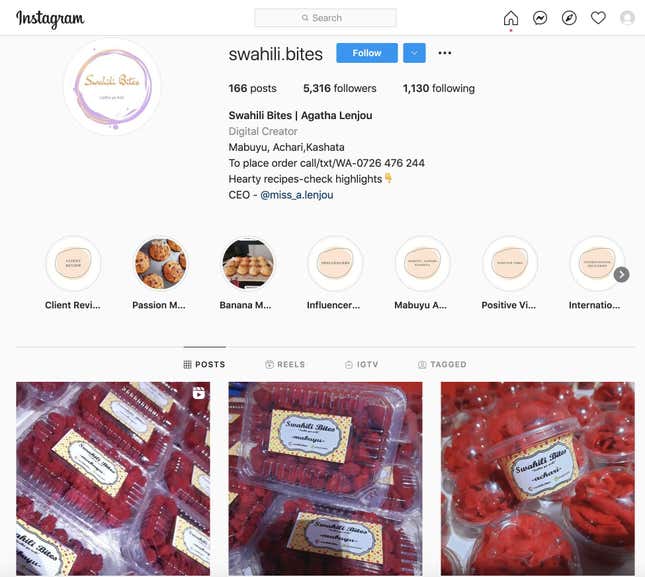When Agatha Lenjou was planning on starting her business of selling Swahili sweets last year, she knew that she wanted to run it on social commerce platforms.
She wanted to reach many people comfortably, conveniently and affordably through social media. Besides trying to get her many followers to buy her products, she knew she could also reach other people through sponsoring her pages and using influencers to market the items.
Lenjou sells mabuyu, achari and kashata, confectionery from the east African coast, on Facebook, Instagram and WhatsApp as Swahili Bites.
A recent study by Caribou Data and the Partnership for Finance in a Digital Africa found that 92% of small and medium enterprises (SMEs) in Kenya use social commerce to carry out their businesses.
“I wanted to reach a larger audience,” Lenjou tells Quartz. “I just went straight to these platforms.”
Many African entrepreneurs have embraced social commerce
Lenjou, who is based in Nairobi, is one of many African entrepreneurs who have embraced social commerce, a type of e-commerce that involves online platforms that support social interaction. Using platforms like Facebook, Instagram, Twitter and WhatsApp, people buy, sell and promote products and services as well as directly communicate with each other.
Social commerce platforms are different from e-commerce marketplaces like Jumia and Konga.com, which are websites with different products from different vendors showcased on the same platform, with the transactions being managed and processed by the website’s owner.

A 2019 GeoPoll survey found that Facebook and Instagram ranked ahead of many e-commerce marketplaces in a list of the most used online shopping platforms in the continent.
The high adoption of social media in Africa, which is enabled by increasing internet connectivity, has led to the rise of this type of e-commerce in the continent, whereby content sharing, messaging, and payment come together.
Africa’s e-commerce footprint is expanding
Africa is one of the fastest-growing e-commerce markets in the world. From 2014 to 2018, the number of online shoppers in the continent increased on average by 18% annually, against a global average of 12%, according to the United Nations Conference on Trade and Development. With its lockdowns and social restrictions, the Covid-19 pandemic is giving this growth a boost.
A study by the United Nations Economic Commission for Africa and GSMA, an organization that represents mobile network operators worldwide, says social commerce accounts for the majority of e-commerce activity in markets such as Chad, Equatorial Guinea and São Tomé and Príncipe, and the Central African Republic.
Globally, according to GSMA, social commerce represented 5% of e-commerce sales in 2018 and was expected to more than triple to 17% by last year.
Social commerce appeals to entrepreneurs because one doesn’t have to be very tech-savvy to use the apps, compared to business software and other tools that call for more sophisticated digital expertise.
Most sales in many parts of sub-Saharan Africa are generated through informal channels. Social commerce helps address issues of financial inclusion since many SMEs and informal businesses don’t have the capacity to borrow money to open stores or grow their businesses, says Stephanie von Friedeburg, senior vice president for operations at the International Finance Corporation (IFC.)
“Social commerce is a bridge or a halfway point between full e-commerce and someone working informally,” she tells Quartz.
Lack of internet access may hinder the growth of social commerce
Mobile technology is a key driver of social commerce in Africa, as the mobile phone is the primary tool people in the region use to access the internet and people tend to use mobile money to pay for goods and services in social commerce transactions. But the lack of access to mobile internet for large swathes of the population presents potential challenges to the ability of social commerce services to scale, Angela Wamola, the head of sub-Saharan Africa at GSMA, tells Quartz.
Social commerce, she adds, could provide significant opportunities with mobile money payments increasingly looking towards super apps where payments and social features are entwined.
Selling products on social media platforms alone may have its disadvantages, as Lenjou and other people in the continent who run their businesses on Facebook, Inatagram and WhatsApp learned on Oct. 4 when the platforms experienced outages. The interruption happened at night, so the following morning, Lenjou had more orders than usual to attend to, which people would have made the previous night. This caught her off-guard.
Lenjou runs her business alone – doing everything including marketing, taking photos of the sweets, posting their pictures on social media, and processing orders.
And the business is thriving. Social commerce has enabled her to sell to her products as far as Ghana and the US.
Sign up to the Quartz Africa Weekly Brief here for news and analysis on African business, tech, and innovation in your inbox.
